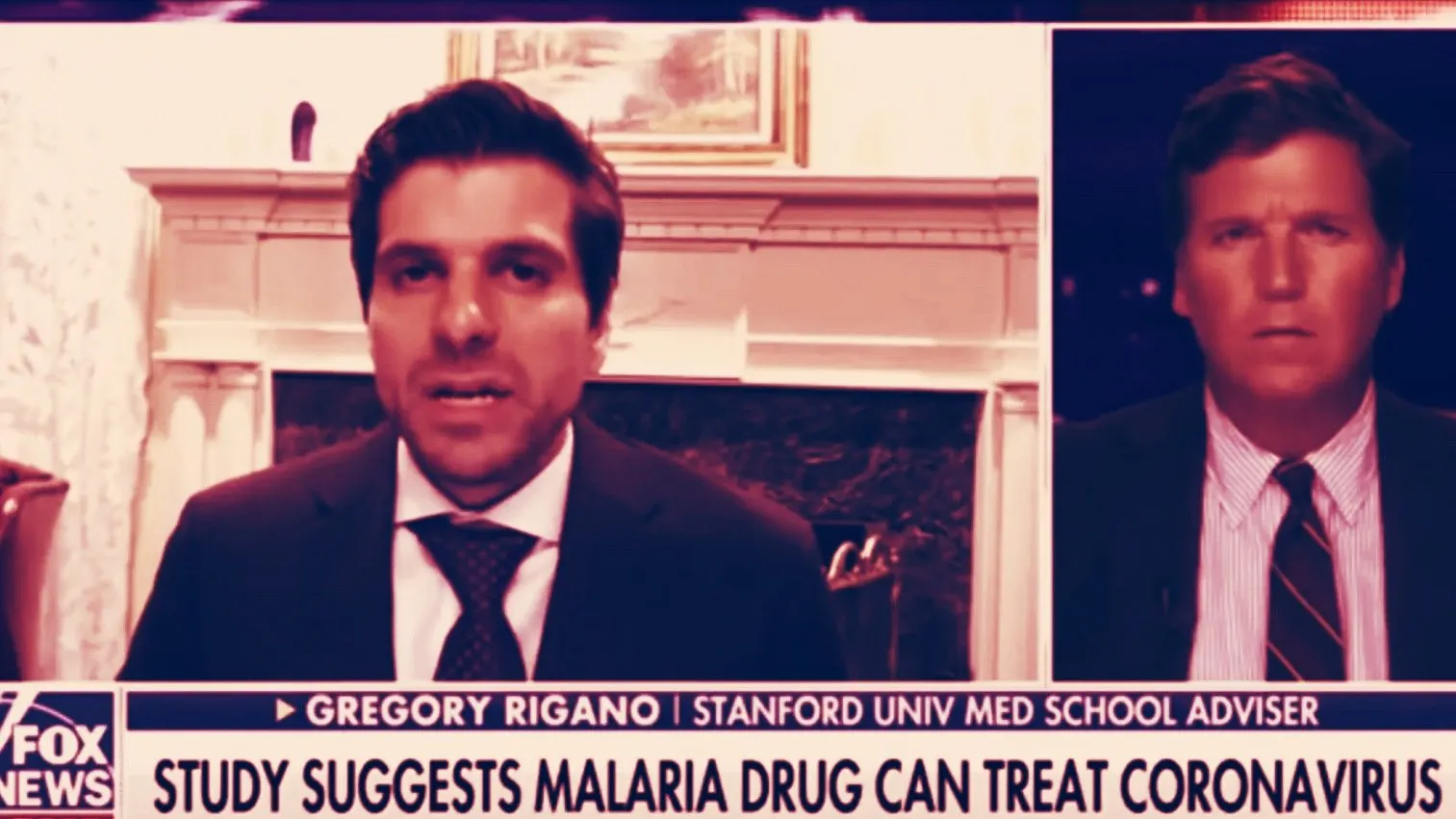In brief
- Gregory Rigano faked associations with Stamford and other universities to promote a cure for coronavirus
- He said that the anti-malarial drug chloroquine was 100% effective as a cure
- Chloroquine's safety and efficacy against coronovirus is under investigation.
A string of fake claims made by a cryptocurrency entrepreneur who espoused the anti-malarial drug chloroquine as a cure for coronavirus have been exposed by the UK’s DailyMail.
On March 13, Gregory Rigano, a lawyer and inventor of blockchain platform IKU, and James Todaro, managing partner at crypto investment fund Blocktown Capital, tweeted out a link to their study on chloroquine as a promising cure for coronavirus.
The paper was shared by Elon Musk, who said the drug might be worth considering. The same drug was advocated by US President Donald Trump as a “miracle from God” and a “game-changer,” despite being unproven. Trump also said the drug was approved by the FDA—when it wasn’t.
But on Thursday, the DailyMail revealed that, while publicizing his chloroquine cure, Rigano made a series of bogus claims. He said he was an adviser to Stanford University's School of Medicine, and touted affiliations with the University of Alabama at Birmingham. But both institutions have denied these claims and have dissociated themselves from the research.
The DailyMail also revealed that Rigano—from Melville, Long Island—had set up a cryptocurrency firm which he said was "designed to cheat death," and has tried to raise funds to “cure ageing” and “end Alzheimer’s.”
Decrypt has reached out to Rigano and will update this article if we hear back.
The research masqueraded as an academic study
The document used to promote Rigano and Todaro’s claims was also formatted to look like a scientific paper when, in fact, it was not. It’s now been removed from Google's public documents for breaching its terms of use.
In a series of interviews last week about his “research paper,” Rigano was repeatedly presented as a “Stanford University Medical School adviser,’’ and a “doctor”—a title he failed to denounce. He also claimed that chloroquine “showed a 100% cure rate against coronavirus.”
Nevertheless, the research eventually caught Trump’s eye, and he wasted no time hailing its potential, despite reservations by White House epidemiologist Tony Fauci. Trump even tweeted a link to a Rigano’s interview broadcast on Fox News.
And, last weekend, the President went further: “HYDROXYCHLOROQUINE & AZITHROMYCIN, taken together, have a real chance to be one of the biggest game changers in the history of medicine…,” he tweeted.
The addition of Azithromycin, an antibiotic, was, in fact, the subject of an “anecdotal” French study by infectious disease specialist Didier Raoult. Despite being mentioned repeatedly by Rigano, the Raoult study is not in line with Rigano and Todaro’s research document, which failed to mention Azithromycin at all.
But Rigano and Raoult have now teamed up and are looking to do their own clinical trial. For that purpose, they enlisted a Dr Chandra Duggirala, a serial entrepreneur based in California whose previous projects include a “personalized nutrition engine.”
However, the publicity generated by the chloroquine claims has resulted in a series of new clinical trials, in an effort to establish the drug’s safety and efficacy.
Daily Debrief Newsletter
Start every day with the top news stories right now, plus original features, a podcast, videos and more.

